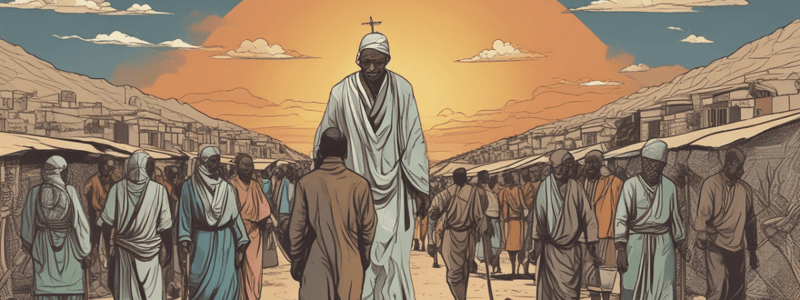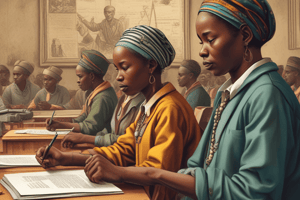Podcast
Questions and Answers
What was the primary role of the South African Council of Churches in the anti-apartheid movement?
What was the primary role of the South African Council of Churches in the anti-apartheid movement?
- Negotiating with the apartheid government for reforms
- Leveraging moral authority and organizational network to challenge injustices (correct)
- Organizing protests and boycotts against apartheid
- Providing financial aid to apartheid victims
Which of the following was NOT a prominent leader of the SACC?
Which of the following was NOT a prominent leader of the SACC?
- Desmond Tutu
- Beyers Naude
- Frank Chikane
- Nelson Mandela (correct)
What was the main purpose of the Kairos Document?
What was the main purpose of the Kairos Document?
- To justify apartheid from a Christian perspective
- To condemn communism in South Africa
- To critique apartheid from a Christian perspective (correct)
- To promote peaceful coexistence with the apartheid government
What did the Kairos Document call for?
What did the Kairos Document call for?
What was the goal of the SACC's mobilization efforts?
What was the goal of the SACC's mobilization efforts?
What did the SACC argue was untenable in the context of apartheid?
What did the SACC argue was untenable in the context of apartheid?
What was the impact of the Kairos Document on the anti-apartheid movement?
What was the impact of the Kairos Document on the anti-apartheid movement?
What was the significance of the SACC's advocacy and leadership?
What was the significance of the SACC's advocacy and leadership?
What did the Kairos Document challenge churches to reconsider?
What did the Kairos Document challenge churches to reconsider?
Why did the apartheid government view the SACC as a subversive organization?
Why did the apartheid government view the SACC as a subversive organization?
What was the result of the government's criticism of the SACC?
What was the result of the government's criticism of the SACC?
What was the role of the SACC's advocacy and moral leadership in South Africa?
What was the role of the SACC's advocacy and moral leadership in South Africa?
What did the principles of the SACC continue to influence in the post-apartheid era?
What did the principles of the SACC continue to influence in the post-apartheid era?
What was the impact of the SACC's actions and the Kairos Document beyond South Africa?
What was the impact of the SACC's actions and the Kairos Document beyond South Africa?
What was the primary function of the South African Council of Churches?
What was the primary function of the South African Council of Churches?
Who were some of the prominent leaders within the SACC?
Who were some of the prominent leaders within the SACC?
What was the significance of the Kairos Document?
What was the significance of the Kairos Document?
What was the result of the Kairos Document's call to action?
What was the result of the Kairos Document's call to action?
What was the SACC's approach to combating apartheid?
What was the SACC's approach to combating apartheid?
What did the Kairos Document argue was necessary in the context of apartheid?
What did the Kairos Document argue was necessary in the context of apartheid?
What did the SACC emphasize in its efforts to dismantle apartheid?
What did the SACC emphasize in its efforts to dismantle apartheid?
What was the impact of the SACC's advocacy and leadership?
What was the impact of the SACC's advocacy and leadership?
What was the central theme of the Kairos Document's theological challenge?
What was the central theme of the Kairos Document's theological challenge?
How did the apartheid government respond to the SACC's anti-apartheid activities?
How did the apartheid government respond to the SACC's anti-apartheid activities?
What was the outcome of the SACC's influence on the transition to a democratic South Africa?
What was the outcome of the SACC's influence on the transition to a democratic South Africa?
What was the significance of the SACC's actions beyond South Africa?
What was the significance of the SACC's actions beyond South Africa?
What was the primary goal of the SACC's advocacy and moral leadership?
What was the primary goal of the SACC's advocacy and moral leadership?
What was the relationship between the SACC and the apartheid government?
What was the relationship between the SACC and the apartheid government?
What was the primary theological challenge posed by the Kairos Document?
What was the primary theological challenge posed by the Kairos Document?
How did the apartheid government respond to the SACC's activities?
How did the apartheid government respond to the SACC's activities?
What was the global impact of the SACC's actions and the Kairos Document?
What was the global impact of the SACC's actions and the Kairos Document?
What was the significance of the SACC's advocacy and moral leadership?
What was the significance of the SACC's advocacy and moral leadership?
What was the nature of the theology advocated by the Kairos Document?
What was the nature of the theology advocated by the Kairos Document?
What was the primary outcome of the SACC's influence on the transition to a democratic South Africa?
What was the primary outcome of the SACC's influence on the transition to a democratic South Africa?
What was the primary contribution of the SACC's prominent leaders to the anti-apartheid movement?
What was the primary contribution of the SACC's prominent leaders to the anti-apartheid movement?
What was the significance of the Kairos Document in the context of apartheid?
What was the significance of the Kairos Document in the context of apartheid?
What was the primary focus of the SACC's mobilization efforts?
What was the primary focus of the SACC's mobilization efforts?
What was the implication of the Kairos Document's call for active resistance?
What was the implication of the Kairos Document's call for active resistance?
What was the role of the SACC in the anti-apartheid movement?
What was the role of the SACC in the anti-apartheid movement?
What was the significance of the SACC's unity in the anti-apartheid movement?
What was the significance of the SACC's unity in the anti-apartheid movement?
What was the impact of the Kairos Document on the anti-apartheid movement?
What was the impact of the Kairos Document on the anti-apartheid movement?
What was the underlying principle of the SACC's advocacy and leadership?
What was the underlying principle of the SACC's advocacy and leadership?
Flashcards are hidden until you start studying




